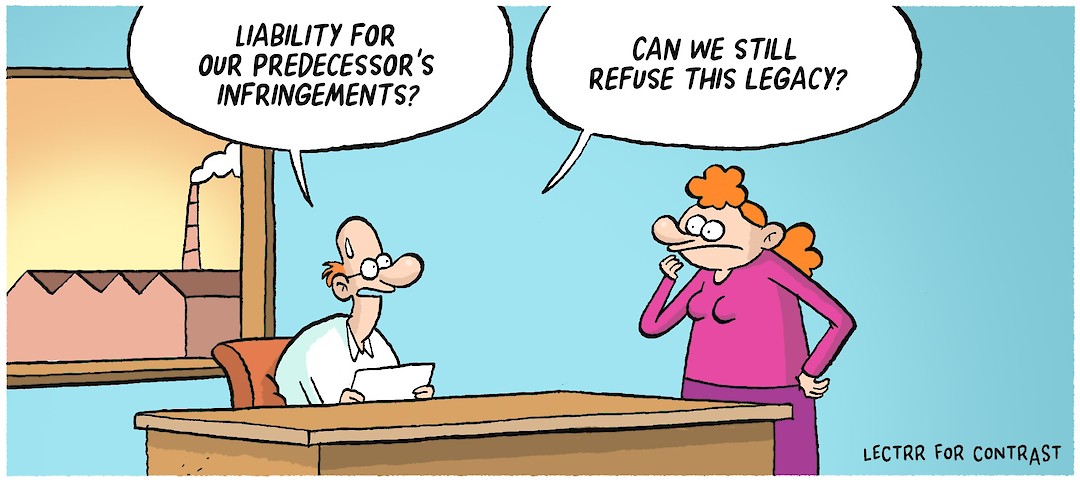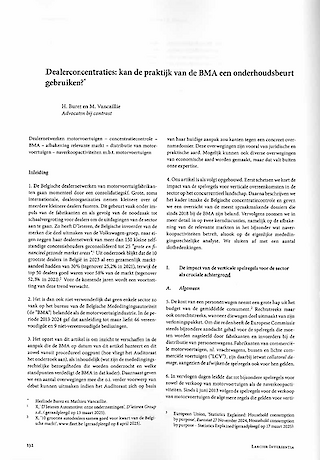In the Picture

The company is liquidated, long live the undertaking!
August 2019Imagine…
Your business is expanding rapidly and you recently took over the activities of a major competitor on the European market.
A short time later, your company is abruptly confronted in multiple European countries with actions for damages due to competition law infringements. These infringements were supposedly committed by the company you took over not long ago.
You are bewildered: your company can´t be responsible for infringements from the past of a different company, can it? And in any case, how can you be held liable for infringements that you had absolutely no knowledge of?
A brief clarification.
Victims of competition law infringements are entitled to full compensation for the harm they suffered. On 14 March 2019, in the case of Vantaan kaupunki v Skanska et al., the European Court of Justice decided that the question of who is liable to compensate this harm is answered directly by the EU law.
According to the Court of Justice, it is the "undertaking" which committed the infringement that is required to compensate the harm deriving therefrom.
The Court clarified that the concept of "undertaking" in a private action for damages has the same meaning as it does in public enforcement by the European Commission or the national competition authorities.
This equivalence has important consequences.
For example, a broad interpretation of this judgment could result in a parent company being held liable under civil law for the competition law infringements of its subsidiary. The judgment thus underscores the importance of setting up competition law compliance programmes for the entire company group, not just at the level of the parent company.
The judgment also has consequences for the M&A practice. In particular, it introduces the concept of “economic continuity” for private actions for damages. Under this principle, the civil liability for a competition law infringement adheres to activities (an “undertaking”) rather than to a specific legal entity. A company that takes over and continues the activities of another company can be required to pay damages arising from the latter’s earlier competition law infringements. Moreover, whether the buyer was aware of the infringement does not play a role. This once again highlights the importance of doing thorough competition law due diligence prior to any takeover (including for asset deals).
Further, the infringing company in the Skanska case was liquidated and its activities were transferred to its parent company. The Court decided that the acquiring parent company could be held liable for the infringements committed by its liquidated subsidiary. The Court of Justice rejected the argument that the action for damages should have been lodged during the liquidation proceeding.
In that connection, the modified liquidation proceeding that is contained in the new Belgian Companies and Associations Code is important. In particular, the new code - whose compulsory provisions enter into force on 1 January 2020 - introduces a limited shareholder´s liability for debts that were not settled in the liquidation proceeding. Under the new liquidation rules, a shareholder of a liquidated company in principle cannot be liable for debts of the liquidated company for an amount that is higher than the balance that he obtained as a result of the dissolution and liquidation. This residual liability is not joint and several, and it is limited for each shareholder to the sum of the contribution reimbursed to him plus his share in the liquidation balance. Moreover, a shareholder will only be liable if he, given the circumstances, at the time of the closing of the liquidation must have been aware of the existence of the debts.
In light of the Skanska case, these liability limitations might not apply for debts that are the result of an infringement of European competition law.
Concretely:
- The "undertaking" that commits a competition law infringement can face claims to compensate the harm deriving therefrom.
- The concept of “undertaking” has the same meaning in a private action for damages as it does in public enforcement by the European Commission or the national competition authorities.
- A parent company may be held liable under the civil law for the competition law infringements of its subsidiary.
- A company that takes over and continues the activities of another company can potentially be held liable for the latter’s earlier competition law infringements.
- The Skanska judgment underscores the importance of setting up competition law compliance programmes throughout the entire company group, and not merely at the level of the parent company, and of doing thorough competition law due diligence prior to any takeover, including for asset deals.
- Under the new Belgian Companies and Associations Code, shareholders of a liquidated company can, under certain conditions and up to a limited amount, be held liable for debts of the liquidated company that were not settled in the liquidation proceeding. After the Skanska judgment, the conditions and the maximum amount that are applicable to this residual liability might not apply for debts that are the result of an infringement of European competition law.
Want to know more?
- Judgment of 14 March 2019 of the Court of Justice of the EU in the case of Vantaan kaupunki v Skanska Industrial Solutions Oy, NCC Industry Oy, and Asfaltmix Oy: http://curia.europa.eu/juris/document/document.jsf;jsessionid=2C4CE2110C783CF0334838E1BF360326?text=&docid=211706&pageIndex=0&doclang=EN&mode=lst&dir=&occ=first&part=1&cid=7704811.
- For further information on private actions for damages: https://www.contrast-law.be/en/publications/in-the-picture/how-much-were-my-cartel-damages-again/.
- The legislative text of the Companies and Associations Code can be found at http://www.dekamer.be/FLWB/PDF/54/3119/54K3119022.pdf.
- Additional information about the innovations introduced by the Companies and Associations Code can also be found via https://www.contrast-law.be/en/publications/in-a-nutshell/.











